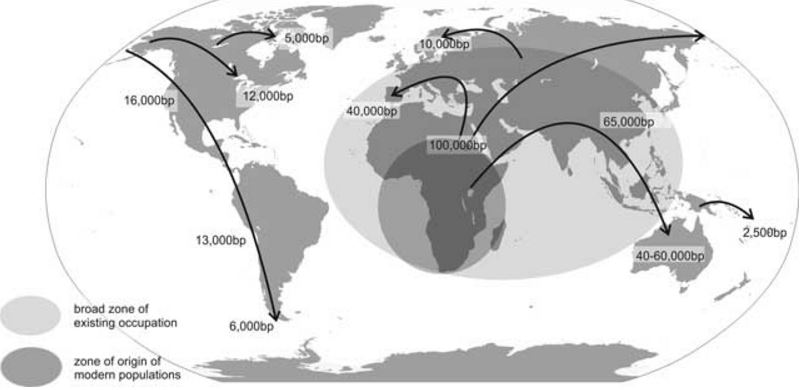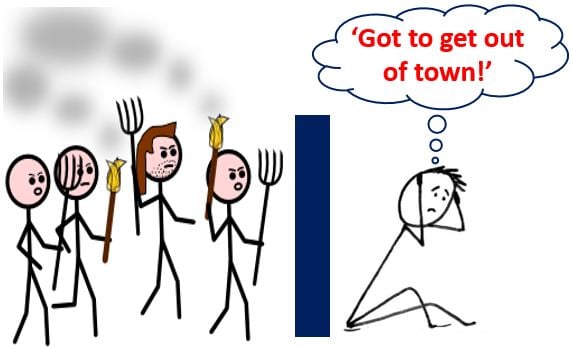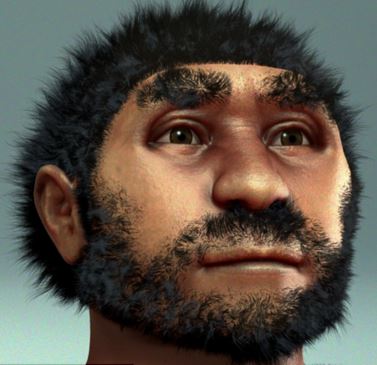Humans have a treacherous and deceitful dark side, which partly explains why we spread so rapidly across the world, says an archaeologist at the University of York in England. About 100,000 years ago, the speed and character of how humans spread changed considerably, a trend that was due in part to the need for people to leave town because former friends had felt let down or betrayed and had it in for them.
Dr. Penny Spikins, who works at the University’s Department of Archaeology, believes that betrayals of trust were the ‘missing link’ in understand the remarkably rapid spread of our own species around the world.
Before 100,000 years ago, ancient humans were slow and mainly governed by environmental events due to ecological changes or population increases. Afterwards, human populations started spreading amazingly rapidly and across major environmental barriers.
 Dispersal pattern of humans after 100,000 BP. (Image: openquaternary.com)
Dispersal pattern of humans after 100,000 BP. (Image: openquaternary.com)
However, Dr. Spikins says these changes are linked to changes in human emotional relationships.
Dr. Spikins writes in the journal Open Quaternary that neither ecological changes nor population increase provide an adequate explanation for the way humans moved into new regions, starting about 100,000 years ago.
We developed a ‘dark side’
She believes that as commitments to others became more vital to survival, and human groups became ever more driven to seek out and punish those who cheated, the ‘dark’ side of our nature also developed.
Moral disputes motivated by a sense of betrayal and broken trust became more common, and encouraged early humans to put distance between them and those they saw as their rivals.
Dr. Spikins says that the emotional bonds which held populations together during crises had a darker side in profound reactions to betrayal which modern humans still feel.
 Former friends who felt betrayed drove people (who wanted to survive) out of town.
Former friends who felt betrayed drove people (who wanted to survive) out of town.
We have a dark side other animals don’t possess
As social networks widened, it became easier to find faraway allies with whom to start new colonies, while more efficient hunting technology meant that any individual with a grudge was in danger. However, it was human emotions which provided the force of repulsion of existing occupied areas – a trait not seen in other animals.
Early hominin species were limited in distribution to certain environments, such as open woodland or grasslands.
The expansion 1.6 million years ago of Homo erectus out of Africa into Asia appears to have been caused by the need to seek out more large scale grasslands.
Contrastingly, Neanderthals inhabited cold and arid parts of Europe. All the archaic species adapted very slowly to new opportunities for settlement and were frequently deterred by climatic and environmental barriers.
We started spreading more rapidly 100,000 years ago
Then, 100,000 years ago, things started to change. Dispersal into distant, inhospitable and risky areas became comparatively more common, compared with movements in regions already occupied.
Most notably, the dispersal of modern human populations was not inhibited by biogeographical barriers. Humans moved into cold regions of Northern Europe, crossed significant deltas such as the Ganges and Indus, tundra, deserts, and jungle environments. They even travelled long distances by sea to reach the Pacific Islands and Australia.
The author argues that betrayals of trust arising from moral disputes were a significant reason for such relatively risky dispersal into apparently inhospitable environments, with a desire to avoid physical harm from disgruntled or revengeful former friends and allies being a strong motivation.
Offenders and any of their allies within a social network would feel driven to ‘get out of town’ – move out of harm’s way.
Dr. Spikins said:
“Active colonisations of and through hazardous terrain are difficult to explain through immediate pragmatic choices. But they become easier to explain through the rise of the strong motivations to harm others even at one’s own expense which widespread emotional commitments bring.”
“Moral conflicts provoke substantial mobility — the furious ex ally, mate or whole group, with a poisoned spear or projectile intent on seeking revenge or justice, are a strong motivation to get away, and to take almost any risk to do so.”
“While we view the global dispersal of our species as a symbol of our success, part of the motivations for such movements reflect a darker, though no less ‘collaborative’, side to human nature.”
Citation: “The Geography of Trust and Betrayal: Moral disputes and Late Pleistocene dispersal,” Penny Spikin. Open Quaternary.25 November, 2015. DOI: http://doi.org/10.5334/oq.ai.


Comments are closed.